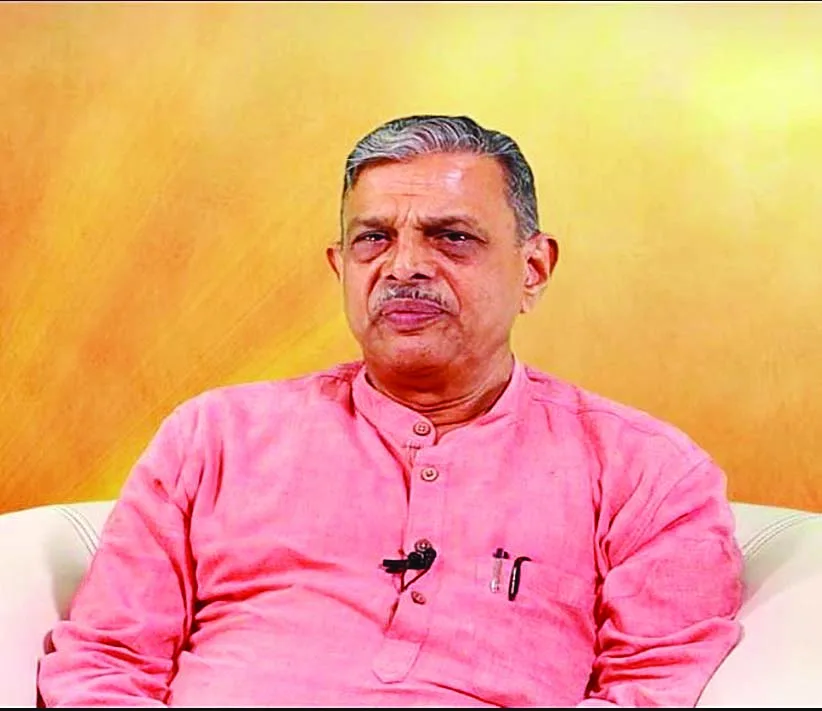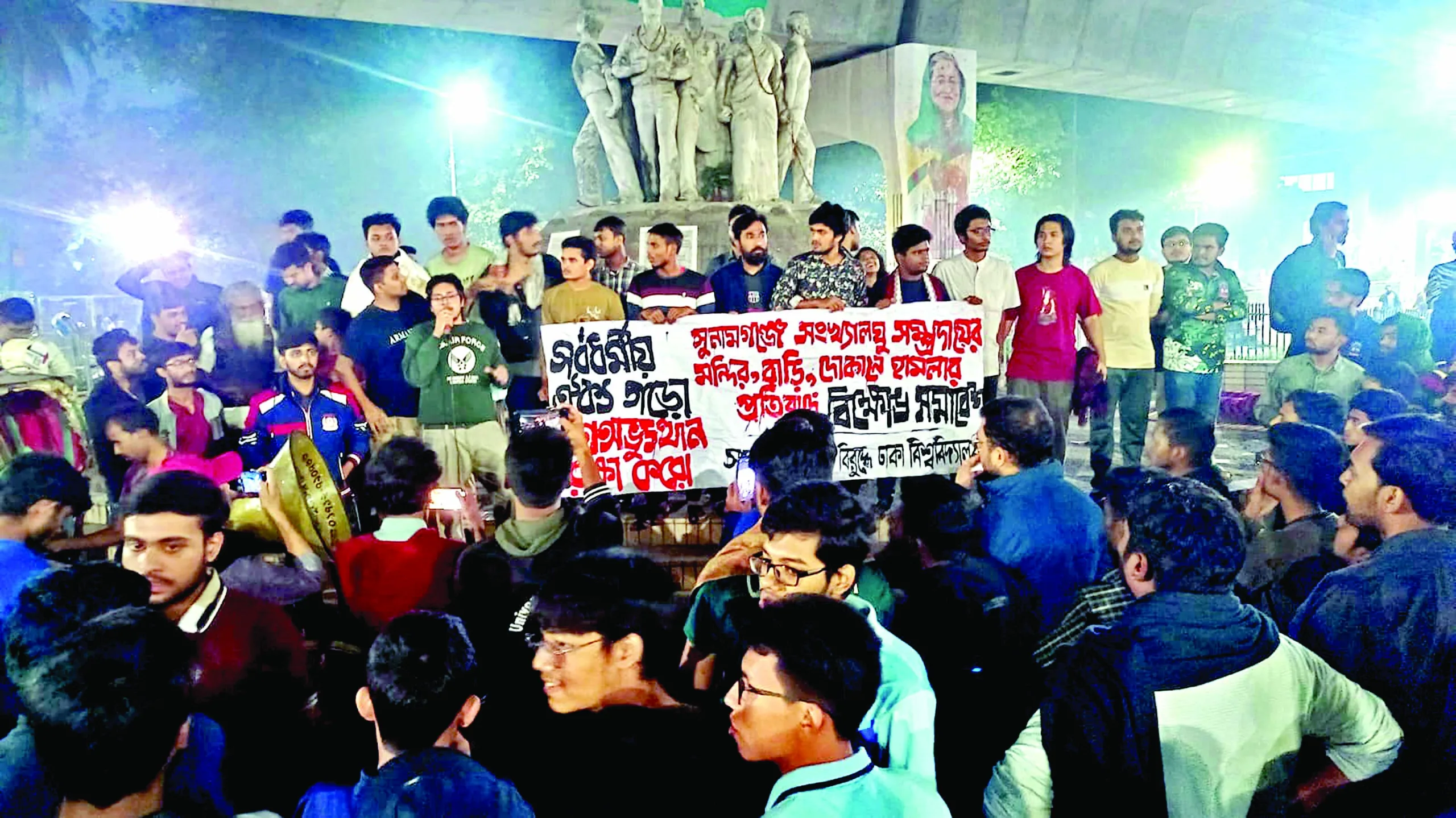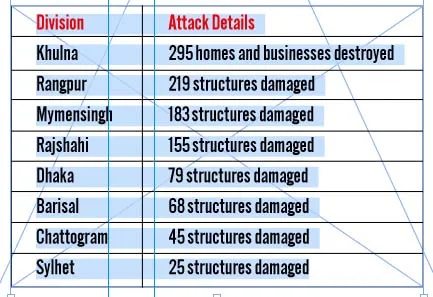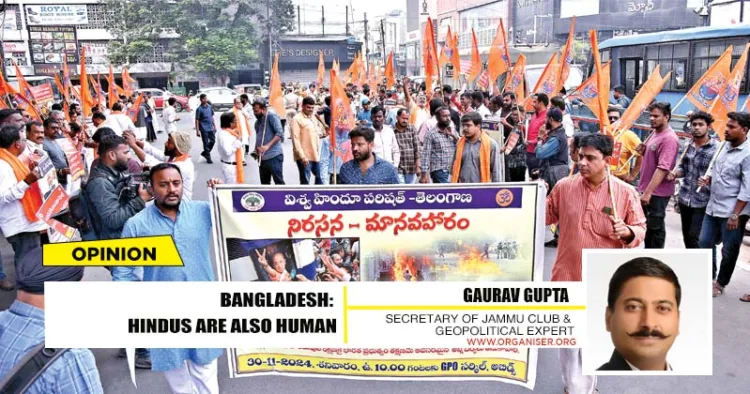The unfolding situation in Bangladesh paints a grim picture of escalating violence, systemic marginalisation and a severe human rights crisis targeting its Hindu minority. Amid increasing attacks, institutional apathy and global silence, the plight of Bangladesh’s Hindu community demands immediate attention and action.
A Grim Human Rights Landscape
The state of human rights in Bangladesh has deteriorated sharply, symbolised by the mass resignation of members of the National Human Rights Commission (NHRC) in Bangladesh .
Their departure followed the release of a damning report on mob violence, exposing alarming trends of targeted harassment against minorities and political dissidents. The resignation of Prime Minister Sheikh Hasina amidst nationwide protests has further destabilised the country, leaving minorities particularly vulnerable.
In the aftermath of her resignation, over 2,000 attacks on Hindus have been reported, reflecting growing lawlessness and an emboldened wave of extremism. This violence threatens the pluralistic identity Bangladesh once aspired to uphold.
Escalation of Anti-Sanatani Violence
The rise in anti-Hindu violence is alarming. Incidents such as the desecration of Hindu temples in Chattogram and the brutal attack on Advocate Ramen Roy highlight the entrenched intolerance faced by the Hindu community.
Advocate Roy, who was targeted for defending a Hindu monk accused of sedition under dubious circumstances, embodies the risks faced by those advocating for minority rights. Such attacks are not isolated incidents but represent a systematic effort to intimidate and silence voices calling for justice and equality.
“Atrocities against Hindus in Bangladesh must stop immediately”

“The atrocities being committed against Hindus and other religious minorities in Bangladesh by Islamic extremists, including attacks, killings, looting, arson, and inhumane persecution of women, are alarming. Rashtriya Swayamsevak Sangh (RSS) strongly condemns these acts. Instead of taking appropriate steps to stop these incidents, the current Government of Bangladesh and other concerned agencies have remained a mute spectator. Out of helplessness, when Bangladeshi Hindus resorted to raising their voice democratically for self-protection, to suppress their voice, a new phase of injustice and oppression is visibly emerged. Bangladesh Government arresting the ISKCON Sanyasi Pujya Shri Chinmoy Krishna Das ji, who was leading one of such peaceful protests of Hindus is unfair. RSS calls upon the Government of Bangladesh to immediately stop the atrocities being committed against Hindus and release Pujya Shri Chinamay Krishna Das ji from the prison. RSS also urges the Government of Bharat to continue with every possible effort to prevent the ongoing atrocities against Hindus and other religious minorities in Bangladesh and take necessary steps to garner international support in this regard. At this critical juncture, Bharat, the global community, and international institutions must stand with the victims of Bangladesh and express their solidarity. It is necessary to demand respective Governments to take possible efforts in this regard is necessary for global peace and fraternity”
— Dattatreya Hosabale Ji, Sarkaryavah, RSS
Hindu temples, homes and businesses have been deliberately targeted, suggesting an organised campaign of violence. The impunity enjoyed by perpetrators only emboldens extremist groups, fostering a climate of fear that forces many Hindus to flee their homeland.
Historical Decline in the Hindu Population
The dramatic decline in Bangladesh’s Hindu population underscores decades of marginalisation and violence. From constituting 22 per cent of the population during the 1971 Liberation War, Hindus now make up onlyeight per cent. This stark demographic shift reflects a history of forced exodus, systemic discrimination, and recurrent cycles of violence.
For decades, Hindus in Bangladesh have faced land grabs, arson attacks, and mob violence, often leaving entire communities displaced and destitute. The targeting of religious leaders and community further erodes any semblance of security for this already vulnerable minority.
Regional and Global Implications
The crisis extends beyond Bangladesh’s borders, straining diplomatic relations with neighbouring India and drawing the concern of international human rights organisations. India, home to a significant Hindu population, has expressed deep concern over the safety of minorities in Bangladesh.

External Affairs Ministers
Jaishankar has urged accountability, emphasising Bangladesh’s constitutional obligation to protect all its citizens. These tensions have affected bilateral relations, with reduced flights, disrupted trade, and growing public resentment on both sides of the border. The muted response from Bangladesh’s interim Government has only exacerbated the situation, raising doubts about its capacity—or willingness—to address the violence.
Criticism of US Policy on Religious Freedom
Former USCIRF Commissioner Johnnie Moore has criticised the Biden administration for neglecting the plight of religious minorities in Bangladesh, describing the violence against Hindus as an existential threat. Moore highlighted the failure of Biden’s foreign policy to address global human rights concerns, resulting in conflicts worldwide. In contrast, Moore praised the incoming Trump administration for its commitment to religious freedom and strengthening U.S.-India ties. He asserted that Trump’s team would approach such crises with greater advocacy and accountability, ensuring human rights remain central to American foreign policy. According to Moore, prioritising religious freedom globally is not only a moral imperative but also essential for maintaining geopolitical stability.
A Call for International Advocacy
The lack of global attention to the persecution of Bangladesh’s Hindus is deeply troubling.
Johnnie Moore has called on India, the United States, and other nations to build alliances to combat religious persecution and promote global religious freedom. He emphasized the need for a robust Indo-U.S. partnership to address the crisis. This advocacy must translate into concrete action. Targeted sanctions, international monitoring, and humanitarian aid are necessary to pressure the Bangladeshi Government to act. By holding perpetrators accountable and leveraging diplomatic influence, the international community can take a stand for human rights.
Attack on Hindus After August 5, 2024
Meherpur District: An ISKCON temple was vandalised and set ablaze, resulting in the destruction of deities of Lord Jagannath, Baladev, and Subhadra Devi
Satkhira District: The Jessoreswari Kali Temple in Shyamnagar was targeted, with the theft of a golden crown gifted by Prime Minister Narendra Modi.
Chattogram District: Multiple Hindu temples, including one in the Navgraha Bari area, were attacked and set on fire by violent mobs
Dhaka District: The Dhakeshwari National Temple, the country’s largest Hindu temple, faced heightened security concerns, leading to increased protection measures by volunteers from various religious communities.
Patuakhali District: A Hindu house and temple were attacked, vandalised, and set on fire by a group of 20 to 25 attackers.
Dinajpur District: Hindu homes and temples were attacked and vandalised, leading to significant property damage and community displacement.
Sylhet District: Hindu temples and properties were targeted, resulting in damage to religious sites and personal properties.

A Call for Justice and Solidarity
The ongoing violence against Hindus in Bangladesh is not just a national crisis—it is a test of the global community’s commitment to human rights and religious freedom. As Bangladesh navigates its interim governance, the plight of its Hindu minority demands immediate and decisive intervention. Governments, international organisations, and civil society must unite to ensure safety, justice, and dignity for all its citizens.
Institutionalised Persecution
Decline in Hindu population
Due to this continuous onslaught, Hindu population in the country has declined from 13.50 per cent in 1974 to about 7 per cent in 2024. The same is with Pakistan, where Hindus are being persecuted by Islamists and Hindu women are being forcibly converted to Islam. Till few decades ago, thousands of Hindus used to reside in Afghanistan. Now, there is no existence of Hindus there.
Arrest of ISKCON Sanyasi Chinmay Das
On November 25, International Society for Krishna Consciousness (ISKCON) Sanyasi Chinmoy Krishna Das, who had been leading rallies demanding security for Hindus in Bangladesh, was arrested from Dhaka airport while travelling to Chattogram in concocted defamation case regarding disrespecting flag of Bangladesh.
Denying legal access
A Bangladesh court on December 3 announced that the next bail hearing in the arrest of ISKCON Sanyasi Chinmoy Krishna Das will be on January 2, 2025, after no lawyer represented him in the court. No lawyers turned up to argue in favour of Chinmoy Krishna Das as a few days ago his lawyer Regan Acharya was allegedly brutally assaulted and his chamber was vandalised.
“Avoid wearing saffron robes and tilak”
ISKCON Kolkata spokesperson Radharamn Das recently said he has urged its monks and followers from Bangladesh to avoid wearing saffron robes and ’tilak’ in public, advising them to practice their faith discreetly amid safety concerns following targeted attacks against Hindu minorities in the neighbouring country

Forced resignation of Hindus
In the wave of anti-Hindu moves, members of the community are being removed from Government jobs, either through dismissal or forced resignations. Hindu teachers and professors, particularly in prominent universities, are allegedly being pressured to resign. This wave of pressure extends beyond educational institutions to include Hindu cadets in the police force. Recently, 252 police sub-inspectors, who had completed their training at the Sharda Police Academy, were dismissed on charges of indiscipline and irregularities, among whom 91 were Hindu personnel. The appointments of these trainees occurred during Sheikh Hasina’s tenure.
Unconstitutional appointments
After the continuous attacks on Hindus, 201 illegal new joint secretaries and several additional secretaries were appointed. Hizb ut-Tahrir is using them to misuse power potentially. Top Jamaat-e-Islami lawyer, Tajul Islam has been appointed the Chief Prosecutor at the International Crimes Tribunal, which will look into cases against political prisoners. The other newly appointed ICT prosecutors include Md Mizanul Islam, Gazi Monawar Hussain Tamim, BM Sultan Mahmud, and Abdullah Al Noman. Tamim represents the plaintiffs in the ICT cases against Hasina and her aides. Mizanul Islam has been designated as an additional attorney general. He had also defended top Jamaat leaders in their cases.
On this Human Rights Day, the global community must reaffirm its commitment to standing against oppression. This commitment transcends borders, compelling nations to hold perpetrators accountable and demand justice for the persecuted.
To secure a peaceful and inclusive future for Bangladesh, the international community must prioritise the protection of its minorities. Key measures include:
- Establishing International Oversight Mechanisms: Independent bodies like the United Nations should monitor violence against minorities in Bangladesh.
- Imposing Targeted Sanctions: Penalising individuals and organisations responsible for perpetrating or enabling violence.
- Providing Humanitarian Aid: Supporting displaced Hindu families and rebuilding destroyed temples and homes.
- Applying Diplomatic Pressure: Urging Bangladesh to uphold its constitutional commitment to pluralism and protect minorities from systemic violence.
With sustained advocacy and decisive action, the world can help prevent further atrocities and foster a culture of peace, tolerance, and coexistence in the region.



















Comments